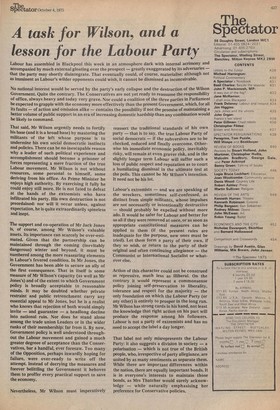A task for Wilson, and a lesson for the Labour Party
Labour has assembled in Blackpool this week in an atmosphere dark with internal acrimony and accompanied by much external gloating over the prospect — greatly exaggerated by its adversaries — that the party may shortly disintegrate. That eventually could, of course, materialise: although not as imminent as Labour's wilder opponents could wish, it cannot be dismissed as inconceivable.
No national interest would be served by the party's early collapse and the destruction of the Wilson Government. Quite the contrary. The Conservatives are not yet ready to reassume the responsibility of office, always heavy and today very grave. Nor could a coalition of the three parties in Parliament be expected to grapple with the economy more effectively than the present Government, which, for all its faults — of action and omission alike — contains the possibility if not the promise of maintaining a better volume of public support in an era of increasing domestic hardship than any combination would be likely to command.
That said, Mr Wilson urgently needs to fortify his base (and it is a broad base) by mastering the militants of the left whose purpose is to undermine his own social democratic instincts and policies. There can be no inescapable reason why a leader of such political experience and accomplishment should become a prisoner of forces representing a mere fraction of the true Labour movement. Mr Wilson is not without resources, some personal to himself, some deriving from his office. As Prime Minister he enjoys high authority. By exercising it fully he could enjoy still more. He is not fated to defeat at the hands of the extremists who have infiltrated his party. His own destruction is not preordained: nor will it occur unless, against expectation, he is quite extraordinarily spineless and inept.
The support and co-operation of Mr Jack Jones is, of course, among Mr Wilson's valuable assets. Its importance can scarcely be over-estimated. Given that the partnership can be maintained through the coming (inevitably dangerous) winter and beyond, it must be numbered among the more reassuring elements in Labour's fevered condition. In Mr Jones, the Government has been able to secure an ally of the first consequence. That in itself is some measure of Mr Wilson's capacity (as well as Mr Jones's) and of the extent to which Government policy is broadly acceptable to reasonable minds. It may be doubted whether private restraint and public retrenchment carry any essential appeal to Mr Jones, but he is a realist who knows that rejection of both would simply invite — and guarantee — a headlong decline into national ruin. Nor does he stand alone among the trade union Leaders or in the wider ranks of their membership: far from it. By now, Government policy is well understood throughout the Labour movement and gained a much greater degreee of acceptance than the Conservatives, bar a handful, ever foresaw. Too many of the Opposition, perhaps inwardly hoping for failure, were over-ready to write off the attempt. Instead of decrying the measures and forever belittling the Government it behoves them to proffer every practical support to save the economy.
Nevertheless, Mr Wilson must imperatively reassert the traditional standards of his own party — that is to say, the true Labour Party of social democrats — if the subversives are to be checked, reduced and finally overcome. Otherwise his immediate economic policy, inevitably risky, will remain at even graver risk, and in the slightly longer term Labour will suffer such a loss of public respect and reputation as to court a humiliating dismissal in the ultimate test at the polls. This cannot be Mr Wilson's intention. It need not be his lot.
Labour's extremists — and we are speaking of the wreckers, sometimes self-confessed, as distinct from simple militants, whose impulses are not necessarily or intentionally destructive — should probably be expelled without more ado. It would be safer for Labour and better for us all if they were removed at once, or as soon as appropriate constitutional measures can be applied to them (if the present rules are inadequate for the purpose, new ones must be tried). Let them form a party of their own, if they so wish, or return to the party of their original and often continuing allegiance — the Communist or International Socialist or whatever else.
Action of this character could not be construed as repressive, much less as illiberal. On the contrary it would represent a commonsense policy joining self-preservation to liberality, tolerance and respect for the majority — the only foundation on which the Labour Party (or any other) is entirely to prosper in the long run. Mr Wilson has strong cards in his hand, not least the knowledge that right action on his part will produce the response among his followers. Labour is not a party of extremists and has no need to accept the label a day longer.
That label not only misrepresents the Labour Party: it also suggests a division in society — a polarisation — which is not true of the British people, who, irrespective of party allegiance, are united by as many sentiments as separate them. While there are important differences within the nation, there are equally important bonds. It is in everyone's interests to maintain those bonds, as Mrs Thatcher would surely acknowledge — while naturally emphasising her preference for Conservative policies.


































 Previous page
Previous page